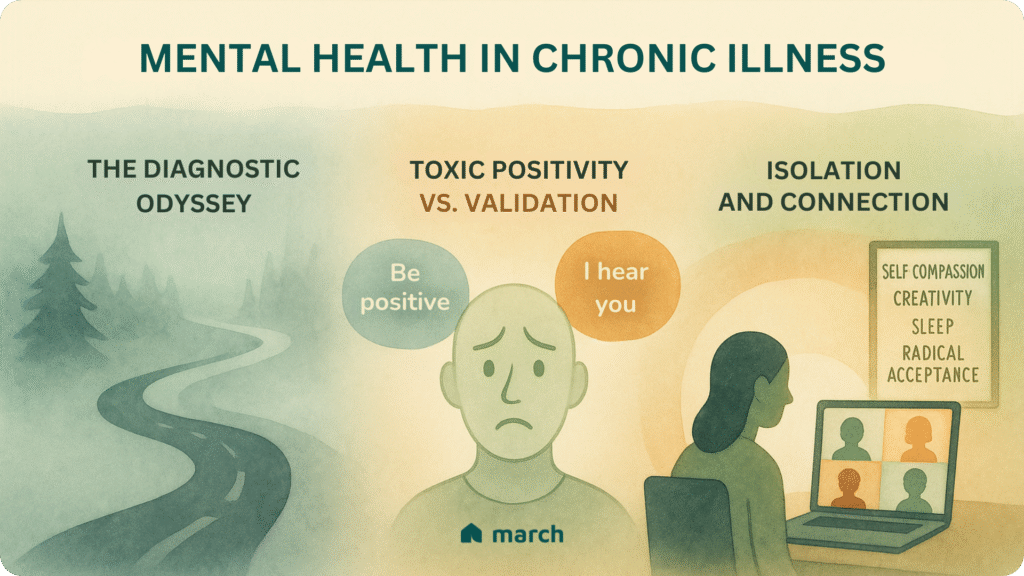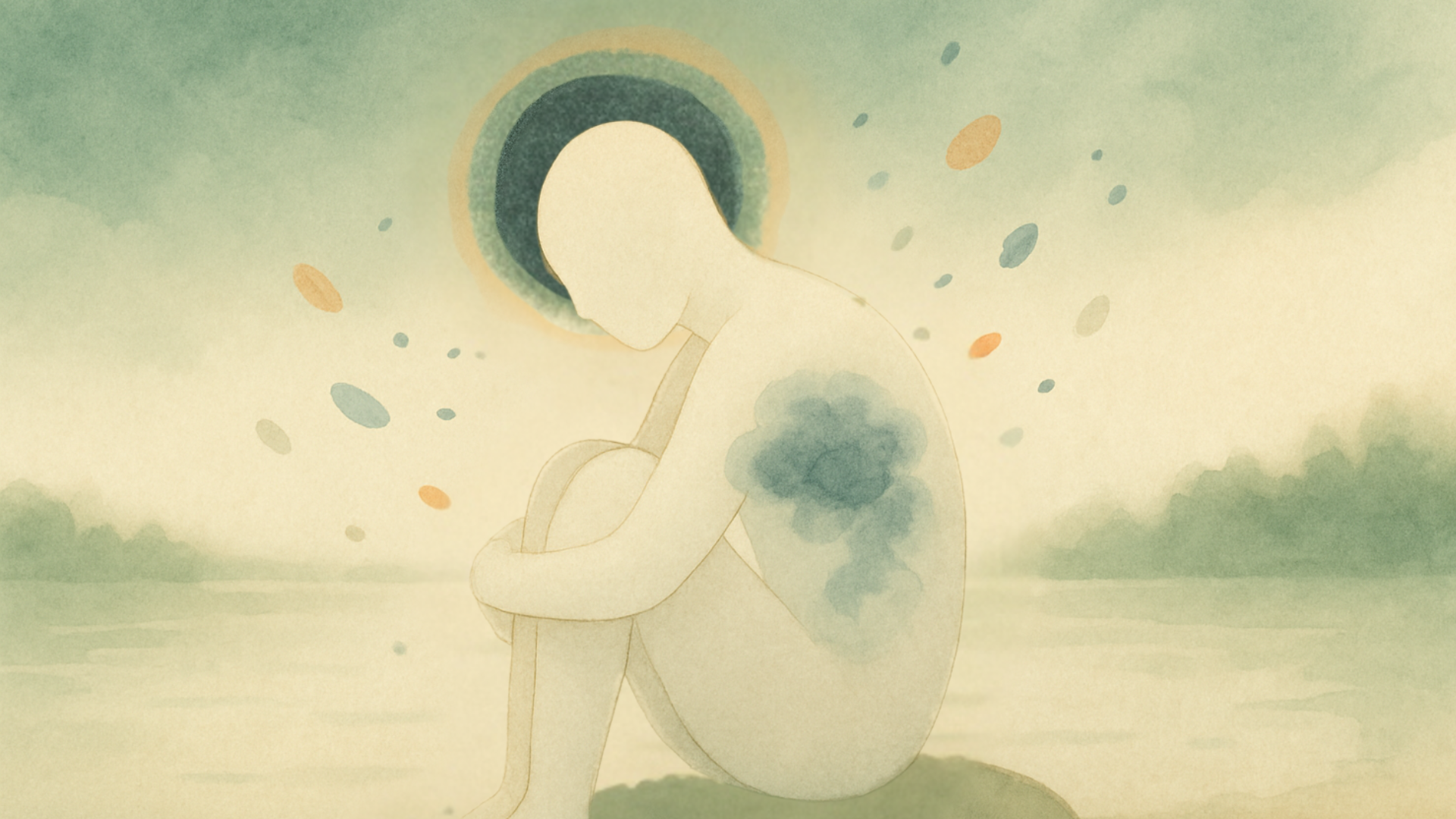Boosting Your Mental Health with Chronic Illness
Living with a rare or chronic illness brings unique challenges. Beyond the physical symptoms, there’s often a quiet struggle with emotional well-being related to mental health issues. The connection between chronic illness and mental health is significant, as managing these dual aspects can be particularly arduous. Many in our community experience what’s called a “diagnostic odyssey,” a long period of uncertainty before finding answers. This path, along with managing daily symptoms, can truly test one’s emotional strength. We know this journey can feel isolating, and we want you to know: you are not alone.
Today, we’re talking about the significant connection between our physical and mental health, especially when living with a rare or chronic condition.
Understanding the emotional journey
It’s completely normal to feel a rollercoaster of emotions. Sadness, anxiety, and a sense of losing control are common. Research shows that people with chronic conditions are two to three times more likely to experience depression. For parents and caregivers, the “diagnostic odyssey” adds layers of stress, confusion, and despair. Even after a diagnosis, the shift can bring anger, fear, and a realization that life is changing forever.
Sometimes, the ongoing medical journey can feel like a continuous, internal trauma, where your own body can seem like a source of danger. It’s crucial for us and for healthcare providers to recognize these feelings are valid.
The hidden grief of chronic illness
Grief for someone living with chronic illness isn’t just about death. It’s about mourning the life you had before the illness; lost dreams, a career, or even your former self. This is often disenfranchised grief, meaning society might not recognize or validate these losses, leaving you feeling unheard. Your feelings are real, and they deserve to be acknowledged.
Beyond “Just Be Positive”: Your Feelings Are Valid
We often hear well-meaning but unhelpful advice to “just be positive.” This “toxic positivity” minimizes your real emotions and can make you feel ashamed or unheard. It’s important to know that feeling the full range of human emotions is natural and healthy. Expressing your pain can actually reduce stress, while hiding it can make feelings worse. When someone struggles, the best thing we can do is listen and validate: “I’m sorry you’re going through this,” or “I’m here for you, no matter what”.

Can I find joy in my life even with a chronic illness?
Living with chronic illness can lead to social isolation, as pain and fatigue might limit activities. Sometimes, friends and family struggle to adapt, or patients themselves withdraw due to a fear of being a burden. Building and keeping connections is vital. Support groups are a wonderful place to connect with others who truly “get it”. Organizations like the National Alliance on Mental Illness (NAMI) and The Center for Chronic Illness offer various groups, many available virtually.
It’s also about finding joy and purpose within your current life. This might mean redefining success, practicing gratitude, and embracing self-compassion. Cultivating a gentle daily routine, engaging in creative activities, spending time in nature, and finding purpose beyond illness can all make a difference.
Is resilience a skill you can learn?
Resilience isn’t a fixed trait; it’s a set of skills we can learn and strengthen over time. This includes cultivating a supportive inner voice, avoiding imagining worst-case scenarios, and practicing radical acceptance of situations. Prioritizing self-care—like good sleep, balanced meals, and gentle physical activity—is also key.
Remember, you don’t have to navigate this alone. Psychotherapy, like Cognitive Behavioral Therapy (CBT), can provide essential skills for managing symptoms and improving outlook. Support groups offer a unique community where experiences are shared and understanding grows.
Your experiences are valid, your emotions are real, and your strength is profound. Embracing your journey means acknowledging the losses, validating your feelings, and actively building a life that, while altered, can still be rich with meaning, connection, and moments of joy. We are here to support you every step of the way.
For a more in depth analysis of this topic listen to our latest podcast episode:
Sources
- Scleroderma Victoria. (n.d.). Building Resilience: An Easy Guide to Managing Life with Chronic Health Conditions. Scleroderma Victoria. Retrieved from https://www.sclerodermavictoria.com.au/building-resilience-an-easy-guide-to-managing-life-with-chronic-health-conditions/
- [Zhang, Z. (2023). Diagnosing rare diseases and mental well-being: a family’s story. Orphanet journal of rare diseases, 18(1), 45. https://www.ncbi.nlm.nih.gov/pmc/articles/PMC9990187/
- Jackson, K. (2014). Grieving Chronic Illness and Injury — Infinite Losses. Social Work Today, 14(4), 18. https://www.socialworktoday.com/archive/070114p18.shtml
- Minnesota Clinic for Health & Wellness. (n.d.). Understanding the Mind-Body Connection: A Comprehensive Guide. Retrieved from https://www.mnclinicforhealth.com/blog/understanding-the-mind-body-connection-a-comprehensive-guide
- The Thriving Spoonie. (2024, July 23). The Dark Side of Toxic Positivity in Chronic Illness Communities. https://www.thethrivingspoonie.com/the-dark-side-of-toxic-positivity-in-chronic-illness-communities/
- NAMI. (2020, April 27). How I Use ACT and CBT to Help People Cope with Health Conditions. https://www.nami.org/Blogs/NAMI-Blog/April-2020/How-I-Use-ACT-and-CBT-to-Help-People-Cope-with-Health-Conditions
- NAMI. (n.d.). Support Groups. Retrieved from https://www.nami.org/Support-Education/Support-Groups
